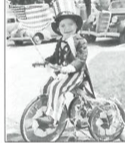 I was somewhat distressed at the political nature of both a letter to the editor and a primary article in the Winter 2000 issue of Tricycle. This political material is not what I subscribe to Tricycle for, and although I agree that where politics, religion and philosophy collide, it is perfectly reasonable for Tricycle to address relevant issues, my expectation is that when it comes to politics Tricycle should rise above polemics.
I was somewhat distressed at the political nature of both a letter to the editor and a primary article in the Winter 2000 issue of Tricycle. This political material is not what I subscribe to Tricycle for, and although I agree that where politics, religion and philosophy collide, it is perfectly reasonable for Tricycle to address relevant issues, my expectation is that when it comes to politics Tricycle should rise above polemics.
In Lisamichelle Davis’s letter, “Elective Affinities,” she writes, “When someone is hungry or sick or suffering, the ‘enlightened’ thing to do is to feed and assist them, and voting is, in its own small way, a step that each of us should take to do just that.” Ms. Davis’s reasoning here is that a personal reflection on social responsiblity should lead us all to band together so that the strong help the weak and the rich help the poor – notions which certainly do seem enlightened – that is, until they are converted into political policy. When these impulses are converted from individual choice to political policy we must question their wisdom. Government is different from all other institutions in that government is the one and only institution with a legitimate monopoly on the use of force. When exercised, such fiat can only reduce suffering in one place by increasing it in another.
The leftist impulse to use the government to force others to take care of those in need – rather than picking up the mantle and taking responsibility oneself, a truly non-egoic response – not only causes suffering to those from whom material is seized, but is really a means of using democratic process to enforce despotic policies, all the while feeding the egos of leftists.
Helena Norberg-Hodge’s article, “Economics and Exploitation in Ladakh,” read to me like a leftist catalog piece. Using the new leftist attack word “globalization,” Ms. Norberg-Hodge reiterates oft-used, uncreative, anti-capitalist rhetoric while passing it off as personal experience .
I am unimpressed with Ms. Norberg-Hodge’s sweeping claims of causal relations validated through direct observation. Economics is the study of human interaction, which includes the aggregate impact of trillions of interpersonal transactions daily. It is as complex, as well understood, and as controllable as the weather. For Ms. Norberg-Hodge to claim that she can derive a causal relation between the undefined term “globalization” and local conditions because of her long presence in Ladakh as an observer is as reasonable as my claiming that I can derive a causal relation between the use of water in the Colorado River by western states and weather conditions in the Sonoran Desert, because I lived in that desert for 23 years.
Furthermore, Norberg-Hodge writes, “Today, fifty of the world’s largest economies are corporate, not national economies.” Here she favors the latter as morally superior and implicitly non-“exploitative.” But “corporate” actually means that individuals are free to engage in and invest in enterprises for-profit or not-for-profit, with their own time and personal resources, as they choose. As far as the term “national economies,” this is the new leftist word for “socialist.” But socialism is a system in which individuals may not engage in or invest in enterprises, with their own time and resources, of their own free will, without first going through a collective approval process – a process which almost universally has served to protect and promote the interests of the powers-that-be – certainly not the interests of the people.
Tricycle may of course choose to continue to address political topics in the future, but if the aforesaid letter and unbalanced, polemical article are examples of what is to come, I think Tricycle will risk becoming a leftist version of the dismal, political-theocratic medias of rightists Jerry Falwell or Pat Robertson.
Daniel Cirignani Wood
Portland, OR
Not having spent years in Asia as Helena Norberg-Hodge has, I nonetheless returned from my travels there similarly bemoaning the effects of the evil-heartless-Western-corporate-advertising persecutors on the kind-gentle-poor-Third-World victims. I similarly wished that the West would learn a thing or two from the Buddhist East and stop shoving false hopes of happiness down their throats, often literally as fast food.
Ironically, when I pleaded my case to a non-Buddhist social economist friend – someone I imagined would have a sympathetic ear – he replied with a stunning practical dhamma talk.
“The people in the East are exactly like us,” he said. “They just want to be happier. They want better, easier lives. Just like us, they believe that by eating that food, wearing those clothes, acting that way, they’ll be better, be happier. We just project our disappointment on them, because we’ve discovered that that’s not true. Those things that we also believed would make us happier, don’t.”
No victims, no persecutors. Human beings on the wheel of samsara, run by greed, aversion, and ignorance, just like the Buddha described. It seems that the real victims in this drama are our sentimental illusions that a Buddhist culture would have transcended the three poisons and be immune to those who make a living catering to them.
Steven Sashen
Boulder, CO
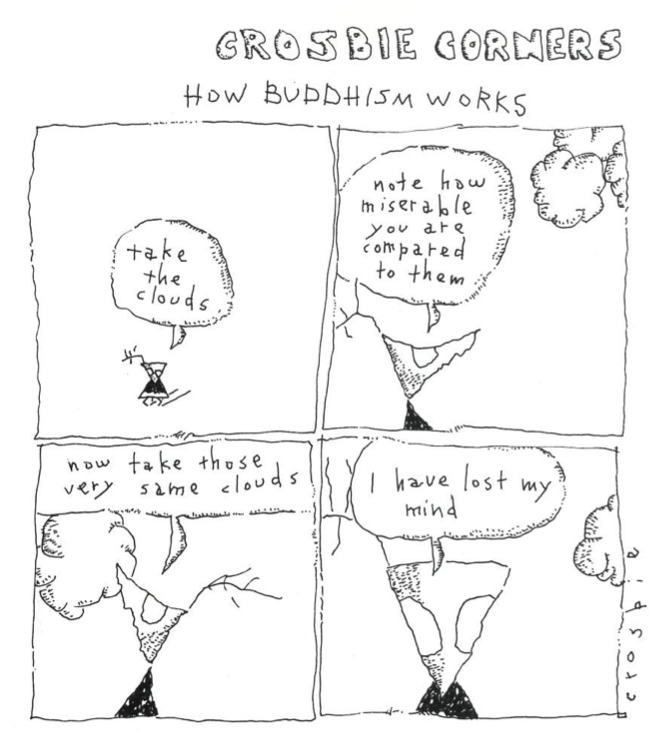
Managing the Monks
I thank Bob Easton-Waller for his article, “Mean Street Monks” (Winter 2000). From a historical perspective (or from a moral or dharmic perspective) there is nothing wrong about the action of the Thai abbot of Wat Chansisamakidham in Stockton, California, who kept adolescent gang members off the streets by opening the doors of the temple to them. Yet some of Abbot Sombun’s lay supporters have accused him and his fellow monks of becoming too familiar with the ways of the world. Such accusations are often brought forward when lay people can’t control their monks, for whatever reasons.
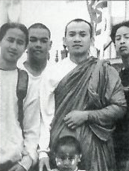 To this historian, what happened at Wat Chansisamakidham is another example of how people have misunderstood “traditional” Thai Buddhism. The temple’s constituents think the abbot has deviated from “traditional” Buddhism, that monks should be ritual practitioners and models of quiet reflection, not referees and guardians to a temple full of street kids. In fact, what the Thai (or the Lao and Cambodians) today identify as the “traditional” role of an abbot or the “traditional” function of a wat is a role or function that was “corrected” by the 1902 Sangha Centralization Act. This was a political tool for the building of the nascent Thai nation-state and had little to do with dharma or strengthening Buddhism.
To this historian, what happened at Wat Chansisamakidham is another example of how people have misunderstood “traditional” Thai Buddhism. The temple’s constituents think the abbot has deviated from “traditional” Buddhism, that monks should be ritual practitioners and models of quiet reflection, not referees and guardians to a temple full of street kids. In fact, what the Thai (or the Lao and Cambodians) today identify as the “traditional” role of an abbot or the “traditional” function of a wat is a role or function that was “corrected” by the 1902 Sangha Centralization Act. This was a political tool for the building of the nascent Thai nation-state and had little to do with dharma or strengthening Buddhism.
What Abbot Sombun did is what revered local abbots in Theravada Buddhism had been doing for centuries before the 1902 Sangha Act: that is, serving as community leaders and being socially responsible. Abbots and monks of the local traditions always had close relationships with young people in the community. In traditional Southeast Asian villages, local monks not only imparted dharma and practical knowledge but also helped mold the characters of the children they taught. They knew all the kids. In fact, the role of monks in local Buddhist traditions in Southeast Asia was more like that of Catholic parish priests today than that of the Theravada monks after the 1902 Sangha Act.
In the 1950s, when I was a child my grandparents lived right next door to a wat in a small town east of Bangkok. The wat was my playground. There were no amusement parks, no playgrounds. Kids usually played on the streets and risked getting hit by trucks. Monks as well as parents preferred that kids play in a temple ground. I don’t remember the monks ever yelling at us kids for making too much noise, climbing trees, or running around in the wat. The monks allowed us to be kids.
Kamala Tiyavanich
Email
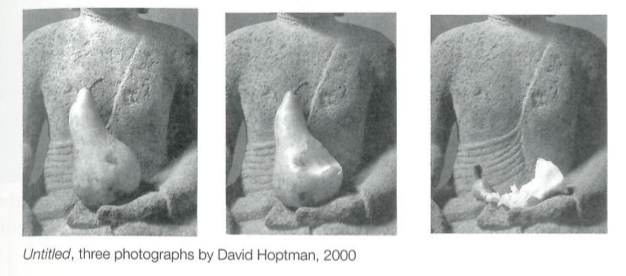 I’m glad to see that you’re giving more space to the issues of Asian American Buddhists in your journal, but the article “Mean Street Monks” illustrates some of the problems that can come when a reporter with no Asian background tries to explain the issues in an immigrant Asian Buddhist community.
I’m glad to see that you’re giving more space to the issues of Asian American Buddhists in your journal, but the article “Mean Street Monks” illustrates some of the problems that can come when a reporter with no Asian background tries to explain the issues in an immigrant Asian Buddhist community.
The article paints the problem of the Stockton temple in classic American terms: compassionate progressive religious leaders vs. narrow-minded traditionalists. Yet look at the behavior of the “traditionalists.” They spread false rumors, make false accusations, threaten the monks with guns and a baseball bat, and force them to sign an affidavit turning the temple over to lay control. Exactly which Buddhist tradition does this sort of thuggery embody? Unfortunately, though – as anyone who has spent time in Southeast Asia will know – there are non-Buddhist Asian precedents for this sort of takeover, and they coincide with the American precedent called the smoke screen. When lay people want to take over the finances of a temple, they charge the monks with inappropriate behavior – to deflect attention from their own intentions – and create enough of a ruckus that the monks feel compelled to give in to them. I’d be surprised if a similar story wasn’t happening in Stockton. The Stockton temple is not the only immigrant Buddhist temple where this sort of takeover has been attempted. A Cambodian temple in Lowell, Massachussetts, is currently fighting off a similar attempt, and the case is now in the courts.
In Asian Buddhist countries there are laws to protect the monks from this sort of threat, and responsible journalists are quick to notice signs of a smoke screen. Here, the legal system is just beginning to inform itself about Buddhist monastic traditions, and to see where in our law there are precedents for protecting an order of religious mendicants. It would be good if our newspapers and magazines – especially those reporting on Buddhism – informed themselves about these less-than-obvious nuances as well. Adaptation is a two-way street.
Thanissaro Bhikkhu
Valley Center, CA
Tall Tales?
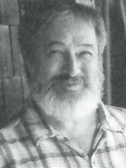 In the article “The Chinese Hermit Tradition: An Interview with Red Pine” (Winter 2000), Red Pine (aka Bill Porter) relates a picaresque story of his father’s life. At one point he says, “Eleanor Roosevelt nominated my dad, Arnold Porter, to be President of the United States on national TV at the 1956 Democratic Convention.”
In the article “The Chinese Hermit Tradition: An Interview with Red Pine” (Winter 2000), Red Pine (aka Bill Porter) relates a picaresque story of his father’s life. At one point he says, “Eleanor Roosevelt nominated my dad, Arnold Porter, to be President of the United States on national TV at the 1956 Democratic Convention.”
There is an extensive public record of what occurs at the major parties’ national conventions. Eleanor Roosevent was the nation’s living saint in the 1950s; her activities, too, are well chronicled. A verification of Red Pine’s statement cannot be had; it is untrue. Eleanor Roosevelt did not nominate a man who (according to Red Pine) had as his highest political office the partisan post of head of the Democratic Party in California.
The record shows that Roosevelt announced before the convention started that she was an enthusiastic supporter of Sen. Adlai Stevenson of Illinois, the first-ballot nominee. No votes were recorded for anyone named Porter.
Is there a mistake? Was any of Red Pine’s tall tale about his father true? Should we believe anything that Red Pine said in the interview conducted by Andy Ferguson?
Troy Anspach
San Francisco, CA
Bill Porter responds:
For all I know the story could be untrue. I was twelve at the time and spent most of my time during the 1956 Convention at Cubs games. When I returned to my eighth-grade class in Coeur d’Alene, my fellow classmates told me they saw my Dad on TV. . . . I certainly didn’t witness any part of the convention and assumed my father’s version of the story re: Eleanor Roosevelt was true. Perhaps he inflated it. I’ve never bothered checking. Certainly his connection with the Kennedys and other leading members of the Democratic Party was something I personally experienced whenever they visited our house in Idaho. . . . As for my father’s incarceration, I assume this can be verified by checking prison records for the 1930s in the state of Michigan. The name to check would be William Arnold Porter.
Good luck.
Rose-colored Rangoon
Doug Booth’s article about his short stay in a Burmese monastery (“Above and Beyond Rangoon,” Fall 2000) saddened me a great deal. This is because Booth paints Burma in a romantic light, ignoring (or perhaps failing to see) the terrible human rights abuses perpetuated in the government’s name.
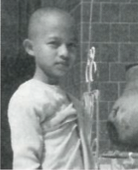 It is obvious that Booth is quite taken with Burma: “At last I was in a culture that was brimming with Buddhism,” and he conveys his wonder at the simple country living he discovered. While Booth does acknowledge that all is not well in Burma (“malnutrition is rampant and a good wage is 30 cents per day”), he does not pursue this observation.
It is obvious that Booth is quite taken with Burma: “At last I was in a culture that was brimming with Buddhism,” and he conveys his wonder at the simple country living he discovered. While Booth does acknowledge that all is not well in Burma (“malnutrition is rampant and a good wage is 30 cents per day”), he does not pursue this observation.
At another point Booth remarks on a Burmese monk’s face: “It was a face that reflected the immense suffering of the Burmese, their devastating poverty, the centuries of warfare they have endured.” But not all Burmese are poor (certainly not the corrupt ruling class), nor were the Burmese always on the receiving end of warfare.
Booth goes on to write that the monk’s face also “reflected their [i.e., the Burmese’s] constancy, their patience, their faith, and their heart. They seemed to understand the Buddha’s words from the Dhammapada, �Hatred never ceases by hatred but by love alone.’ ” These generalizations are insulting to anyone who has been following the abysmal political situation in Burma, which is brutally run by a military dictatorship. For how can such a “Buddhist country” give rise to the repression of the democracy movement; forced labor; forced village relocations; widespread corruption at all government levels; or the horrors inflicted by the Burmese army on their own countrypeople, which include rape, murder, and forced conscriptions?
It distresses me that Booth sees the Burmese people as a whole through rose-colored spectacles. Booth’s condescending language actually serves to dehumanize the Burmese, and minimizes the struggles of those who are fighting for social and political change in Burmese society.
Andrew Matzner
Chiang Mai, Thailand

Anarchy in the U.S.
I found it puzzling – and, I’ll admit, a bit disappointing – to see that Tricycle invited writers to share their views on voting and freedom and democracy without including an anarchist voice. Most of the writers seem to be wrestling with their place as Buddhists within Amerika’s (small “d”) democracy, but none seem to question whether it is a system that should be changed or in fact opposed. They begin with assumptions, not questions, not looking with a clear eye.
Why do we need a government? Why can we not, as Buddhists, begin at the very root of this question? Is it unthinkable that human beings are capable of coexisting without government? Does government exist to enable us, or restrain us? Are there any examples of societies where government protected people from each other, or do they exist to protect the prosperous few from the restless many?
These are questions left out of your contributors’ writings. They assume that government is necessary and good. They are na�ve, and I can only assume that they (like your predominantly white, upper-middle class, educated, baby-boomer readership) have been well served by the brutal policies of the Euro-American hegemony.
At every turn, governments have stood against the wishes of common people, and for the rights of the rich to pursue profit without regard for compassion or fairness. Given the facts, it is clear that voting for a representative from either of the corrupt and disingenuous parties is a fool’s game. It’s an act of mindlessness, not mindfulness.
I urge your readers to expand their vision and envision a world without governments. Fellow Buddhists, get a clue: The government is not your friend.
Eric Bergkvist
Riverside, CA
Correction
I read with interest Neil Gordon’s piece “Faith in Freedom” (Fall 2000). I would like to correct him on one point, however. The Vietnamese Buddhist monk Thich Quang Duc did not immolate himself in the streets of Saigon on May 11, 1963, as a protest against the American presence in Vietnam. In fact, at that time the American presence there was limited (to CIA operatives and Special Forces advisors sent by President Kennedy). Overall, Thich Quang Duc ended his life as a protest against the repression of Vietnamese Buddhists by South Vietnam’s U.S.-backed Catholic president, Ngo Dinh Diem, his brother Ngo Dinh Nhu, and Nhu’s wife Madame Nhu.
Marc Phillip Yablonka
Burbank, CA
Thank you for subscribing to Tricycle! As a nonprofit, we depend on readers like you to keep Buddhist teachings and practices widely available.